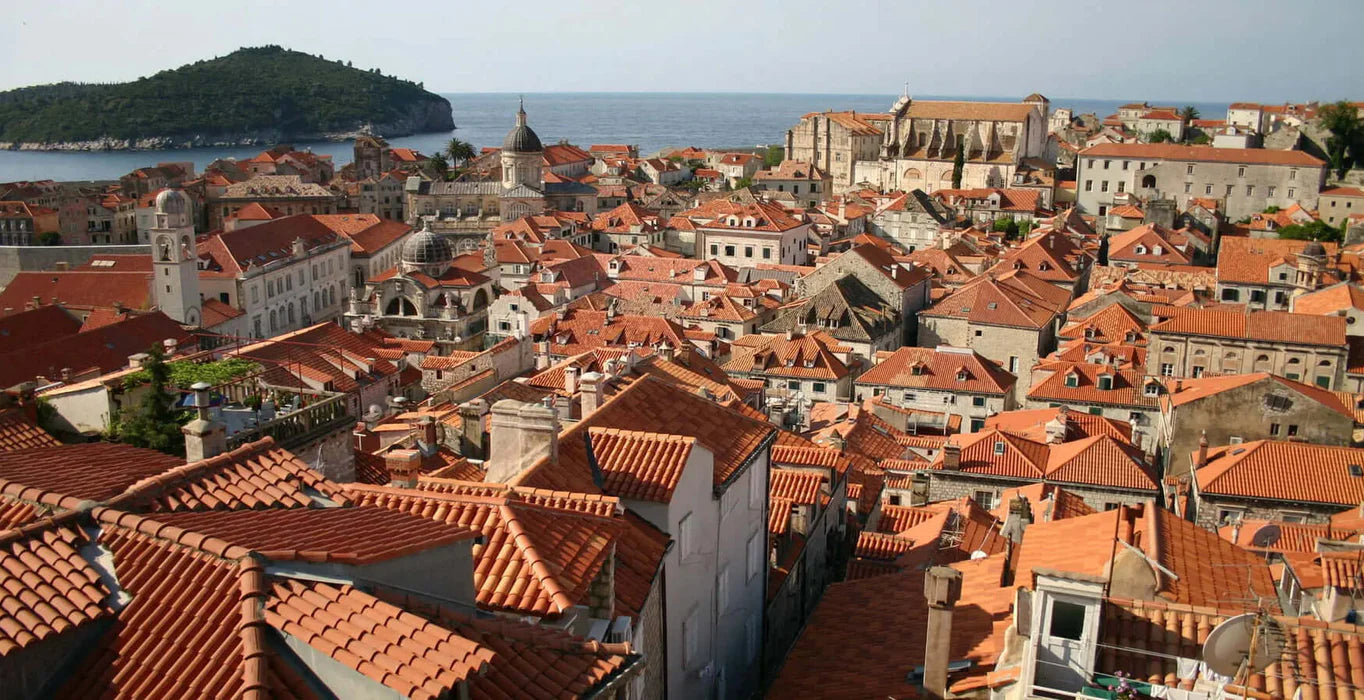Table of Contents
- Choose Your Destination Wisely
- Research Cheap Flights
- Use Public Transportation
- Travel Slow
- Stay At a Cheaper Place
- Eat With The Locals
- Guidebooks, Not Guides
Let’s face reality: travel can be expensive. You’ve probably seen all of those beautiful photos on Instagram where someone has a wistful and dreamy smile on their face while they stand in an amazing location, reaching their hand out to you as if to entice you to join them. “Well, too bad,” you might think because they’re a wealthy world traveler and you’re just a poor soul stuck at home without much money.
Well, think again. Travel is no longer just for the rich. A common myth that has been destroyed in recent decades is that one must have a large sum of money to travel around the world (or anywhere abroad). Yes, travel can be done cheaply, safely, and extensively these days, and it’s not too hard to figure out how. After all, many of those Instagram-famous travelers are already doing it cheaply, and so are many others that aren’t Instagram-famous.
My wife and I have done it – and we’re not rich or famous. We once spent an entire three months on the other side of the world for only a few thousand dollars. All it takes is a little research, some common sense, a willingness to explore, and the ability to lower your standards of luxury for a little while. We have put multiple long-term and short-term trips on our travel resume, all on a tight budget. With the following tips and advice, you can too. Whether you’re a first-time international traveler or if you want to stretch your money to travel for a little bit longer, below are some of the easiest practical planning tips to save money while traveling.
So, let’s get to it. Here’s how you plan a trip on a tight budget.
1. Choose Your Destination Wisely

By far, the advice that I give out the most to any new traveler is to choose an inexpensive destination. Some parts of the world will cost significantly less than others. It should be no surprise that Europe, Australia, and the U.S. are the most expensive places to visit. On the other hand, Southeast Asia is a budget traveler’s dream. Here you’ll find beautiful beaches, amazing food, nice accommodation, and efficient transportation. And it’s all for a fraction of the cost of Europe!
While Southeast Asia has become a mecca for budget travel, other regions are also inexpensive and equally as exciting. Central and South America are also quite affordable, as are South Asian nations such as India and Nepal. While Europe is often included on a travel bucket list, perhaps consider Eastern European nations as they tend to be a little cheaper than those in Western Europe, including Poland, Romania, and Slovakia.
Also, just because a country is cheap doesn’t mean that it is sketchy or dangerous. Don’t let the news or media influence your opinion of other regions of the world. It can be easy to fear travel if you watch the news, but the truth is that the vast majority of countries are perfectly safe. Personally, we’ve traveled through the Middle East and had an absolutely amazing time while doing so. The prices can vary depending on the countries visited, but our adventure through this often avoided region taught us not to cross off anything from our list until considering all options.
2. Research Cheap Flights

Depending on where you visit, the flight can be the most expensive part of a trip. For example, our three month trip to Southeast Asia was very affordable once we arrived, but the flight around the world from the U.S. was very expensive. We researched our flight meticulously before purchasing tickets. A number of discount airline websites are available, so why not check all of them? They always seem to be changing and shifting around, so there is never just one place to look.
If you have a flexible schedule, look into traveling at different times of the year. The shoulder seasons or low seasons are often a great time to visit a place, as you’ll get a lower-priced flight (and other costs will be cheaper, too).
Also, consider flying into different cities in your destination’s region. Make a list of all of the major cities on your planned route and then look up prices for all of them. Once you find a good price for a flight, you can usually rearrange your land-based transportation. For example, if you plan to visit Paris, Amsterdam, Berlin, and Zurich, then you could fly to any of those cities and then loop through all of them by train or bus. Make sure to consider open-jaw tickets, too!
3. Use Public Transportation

Other than flights, land-based transportation is often a huge portion of our travel budget. Take the cheapest form of transport as much as possible. Have you ever taken a ride on the chicken bus? Well, you should, and for one reason only: it’s awesome! The local buses will give you a glimpse into your destination’s culture that you would have otherwise missed. If you take another flight, grab an Uber, or take a tour bus, you won’t get to experience the culture of this place. Oh, and did we mention that these local buses are usually extremely inexpensive?
Other options are often available, too, depending on where you are. In Europe and Asia, trains are often a very popular and affordable way to get around on a budget. Instead of opting for the high-speed rail, take the local trains. You can save money and perhaps even have another cultural experience with the locals!
4. Travel Slow

You may have heard of a popular concept known as “slow travel.” The idea is simple — stay put, and you’ll save money while experiencing a place for all it has to offer. After all, if you’re more stationary, then you’re not buying a plane ticket or a bus ticket, thus saving money. Slow travel gives you the ability to really get to know a city, find all of the best restaurants, and see more than just the tourist highlights.
Live like a local for a week or two — and save some cash while you do it!
5. Stay At A Cheaper Place

After transportation, accommodation is the next most expensive thing on the list. Many travelers feel like they need a nice, luxury hotel as a safety net or as an escape from the unknown world of their destination. Unfortunately, this only creates a further divide between yourself and the locals. After all, didn’t you visit this place so that you could learn more about it and the people who live there?
On our journeys, we’ve always viewed a hotel or hostel as a place to sleep and no more, opting to spend most of our days out seeing the sights and eating at the restaurants. Unless you’re staying at a gorgeous beach resort that is a destination in itself, then why should you spend so much money on a room that you’ll only see at night?
Why a Hostel?
Yes, for those of you that are new to international travel, I used the “hostel” word up there. Don’t freak out! Hostels are not a setting for murder movies or are continuously filled with marijuana smoke. On the contrary, hostels can be quite nice and very affordable. Sharing a dorm room with a few other people is a great way to save some money and meet new people.
Meeting other travelers is often one of the best experiences that we’ve had while traveling. In fact, there are different types of hostels for different types of people (such as relaxing surfer hostels or party hostels in Paris). We’ve made lifetime friends with some of the people that we’ve met at hostels, and for a good reason — they’re cool, normal, and interesting people! We’ve never been murdered, I promise.
If you don’t want to share a room, many hostels actually offer private rooms for couples or singles. Then, you can enjoy the benefits of a hostel (the social life, using the kitchen, etc.) all while having the privacy of your own room.
Bed & Breakfast Options
While hostels are a good start, you shouldn’t count out the idea of a bed and breakfast. In many countries, most B&Bs are actually small, affordable, and locally-owned. They are a perfect option for a couple or a family looking to save some money and have a cultural experience at the same time.
6. Eat With The Locals

For my wife and I, food is one of the reasons why we travel. Every country and culture has its unique cuisine, and I am on a personal mission to taste it all! But food can get expensive, especially if you’re in a city known for the high costs of restaurants and cafes. In my experience, you can find the best food and save your budget at the same time by avoiding many of the overpriced restaurants that operate in the highly touristed areas of a city. Instead, venture to where the locals live and eat, and try the shops and restaurants they enjoy.
Don’t dismiss street food, either. Many cities in other parts of the world have entire streets or markets dedicated to cheap food vendors. Here, you can find authentic food, family recipes, and great prices. As long as you can see them cooking the food to make sure that it’s safe, then you shouldn’t need to worry about getting sick. Remember, when it comes to food safety, cook it, peel it, wash it, or vomit.
7. Guidebooks, Not Guides

If you’ve done any travel research, you’ve probably figured out that tours can be much more expensive than planning an independent trip by yourself. Generally, this is true, although there are deals to be found depending on the destination. In addition to planning your trip, you can use a guidebook for the historical and cultural knowledge while you wander around a city.
All of my travels have led me to believe that there is no substitute for a local guide providing me with all of the information I might want. However, these guides can be expensive. Use your guidebook where you can and hire a guide only for a short period of time to save your travel budget. Group walking tours that last a couple of hours are also a great way to get an overview of a city. Then, spend the rest of your time exploring on your own.
Happy Travels!
That sums it up. Remember, there is no such thing as a “wrong” or “right” way to travel, so anytime you’re having fun without breaking the bank is a winning combination. Try not to let your desire to save money create too much stress, as this is counterproductive to the idea of travel itself, after all.
Now, go see the world!
Bryan Tighe has visited over 50 countries and has an obsession with traveling cheap and experiencing local culture. With his wife Laurie, he co-founded Budget Your Trip, a website which helps other travelers figure out how much stuff costs around the world. He also enjoys photography and being a dad.










Share:
How to Plan Your Dream Destination Wedding
A Day Hiker’s Guide to America’s Mountains